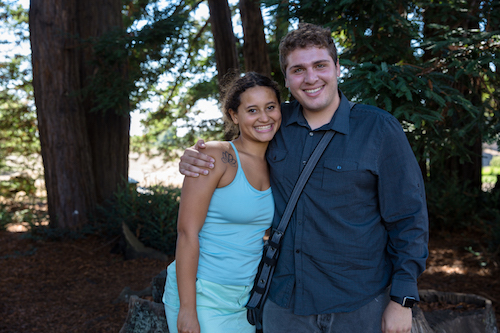Donnae Smith was raised in the Harlem projects in the 1960s, when The Jackson 5 and Little Stevie Wonder blared from car radios.
Smith, UC Santa Cruz's Diversity and Inclusion Program coordinator, shared her story with around 325 residence hall staff members this month, as part of an annual cultural competency training for residence assistants (RAs), who are also student leaders within the campus's ten residential colleges.
"There's a music, a language, a culture that comes with a place," Smith tells students.
And your experiences and your culture—the people who raised you, or "loved you up," as Smith puts it—shapes how you see others, she said.
For the past eight years, Smith has been delivering a training to students to help them support the difficult conversations that can come when students from a variety of backgrounds come together in an intimate, college environment. The four-hour workshop was held with students at all 10 resident colleges.
The focus of the training is influenced by the national landscape, as well as the campus's needs, Smith said. A survey last year showed that black students feel less welcome than other racial groups on campus. Due to the survey, and police shootings across the nation of unarmed black people and the Black Lives Matter movement, Smith decided to shift the focus of this year's training.
"You're not born a racist. You're not born a sexist. You're not born homophobic. You learn all of that," she said. "And when you realize that, you're unlearning that and you're replacing it with what's right."
RAs began with an online test for implicit bias, administered by Harvard University, which measured for a "preference" for white or black people, based on a timed word and photo association assessment. Results were confidential, and meant to raise awareness of any unconscious bias.
Students watched videos on race, including one on the history of suburbia, and how Italian- and Irish-American soldiers escaped the ghettos after World War II, due to home loans that were denied to African American soldiers because of their race. Smith led discussions about gender, sexual orientation, race and ethnicity, and how those identities shape others' views and give power and privilege.
The real lesson, Smith says, was showing students how to have these discussions.
"You need to see where the hope lies around these issues of difference, and in particular with these dialogues around race, which in this country we are told we can't have without it leading to fisticuffs," Smith said. "And there is a way to do that, and I can help you do that. There's an attitude, a value you have to bring with you to that conversation. There are certain things you need to check in your responses and your triggers, and know who you are and know your issues."
Kaitlin Tannyhill, a senior majoring in business management and economics and RA in Porter College, says the training taught her to take each relationship on a "case by case basis."
Tannyhill said she's biracial, but "passes" as white and hasn't dealt with discrimination.
"It's bad to say to someone who's black, 'Oh, how should I talk to black people?" Tannyhill says. "I think it's more important to say, 'Oh, how can I talk to you about this?' or 'How can I be an ally to you?'"
Saying otherwise creates a separation, she says.
"It makes it seem like you're distinguishing even more, rather than talking to them like they're a person with an identity who wants to be respected," she said.
Evan Blank, a junior and computer science major who is also an RA in Porter College, said he learned that sometimes people say offensive things without realizing it.
"You have to separate the action from the person, and when you do that, also separate the person from the group," Blank says. "If you're talking to one African American person, that's not a representation of all African American people, you know?"
Discussions about the police shootings, for example, often end with someone getting upset.
"A big part of fixing that problem is trying to inform people on the difference between people and their opinions, and so just because people have an opinion doesn't mean that they are that thing," Blank said. "So I think that's one of the main things people should focus on. Once they do that, people will actually start to listen to each other."



